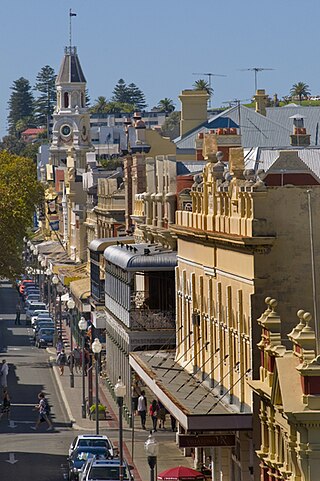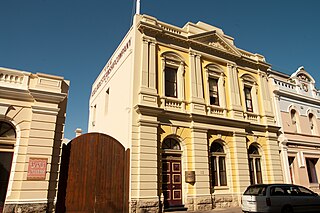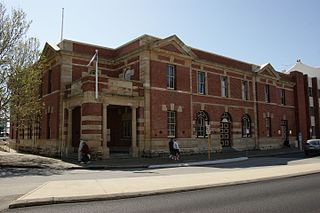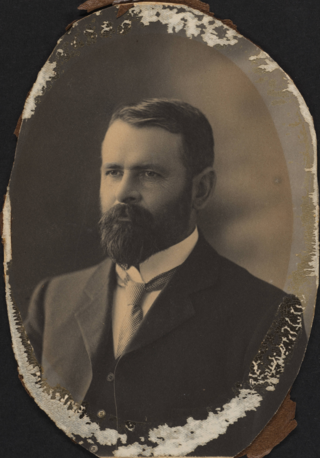
Fremantle is a port city in Western Australia located at the mouth of the Swan River in the metropolitan area of Perth, the state capital. Fremantle Harbour serves as the port of Perth. The Western Australian vernacular diminutive for Fremantle is Freo.
The Causeway is an arterial traffic crossing in Perth, Western Australia, linking the inner-city suburbs of East Perth and Victoria Park. It is carried over the Swan River at the eastern end of Perth Water by two bridges on either side of Heirisson Island. The current Causeway is the third structure to have been built across the river at this point.

The Fremantle Arts Centre is a historic building complex on Ord Street in Fremantle, Western Australia.
Australian non-residential architectural styles are a set of Australian architectural styles that apply to buildings used for purposes other than residence and have been around only since the first colonial government buildings of early European settlement of Australia in 1788.

The City of Subiaco is a local government area in Western Australia. It covers an area of approximately 7 km² in inner western metropolitan Perth and lies about 3 km west of the Perth CBD. The City includes the historically working-class suburb of Subiaco centred around Rokeby Road. Since the 1990s the area has been extensively redeveloped and gentrified.

The 1910 Perth Technical School building is located at 137 St Georges Terrace, Perth, Western Australia, adjacent to the Old Perth Boys School building, which had served as part of the school's former temporary premises since opening of classes there on 16 May 1900.

Old Perth Fire Station is located at 25 Murray Street, at its intersection with Irwin Street, in Perth, Western Australia.

The Esplanade Hotel is a hotel located opposite Esplanade Park, on the corner of Essex Street and Marine Terrace, Fremantle, Western Australia. The building stands on the site of the first building used for housing convicts transported from Great Britain in 1850.

The Old Fremantle Police Station and Court House Complex is a heritage-listed group of buildings located at 45 Henderson Street, Fremantle, Western Australia. The complex includes the former courthouse, police station, police barracks and lock-up and artillery drill hall.

Customs House and former Falk & Company Warehouse is an historic three-storey brick building located in Fremantle, Western Australia. The building has a number of prominent ornate façades on Phillimore Street between Henry and Pakenham Streets. It houses the Fremantle regional office of the Australian Customs and Border Protection Service, Centrelink, and a number of other Australian Government offices.

High Street is the main street running through the City of Fremantle, Western Australia. The street passes by historic landmarks, including the Round House, the Fremantle Town Hall, and the Fremantle War Memorial, through the Fremantle West End Heritage area and through two town squares. Trams operated along High Street for 47 years, between 1905 and 1952. Running east–west, High Street continues as Leach Highway, a major arterial road, at Stirling Highway, linking Fremantle with Perth Airport although the stretch of road between Stirling Highway and Carrington Street is known locally—and signed—as High Street.

The Adelaide Steamship House is located at 10-12 Mouat Street, Fremantle. Built in 1900, the building was designed by Fremantle-based architectural firm Charles Oldham and Herbert Eales and was constructed by C. Coghill. The building takes its name from the original owners of the building, the Adelaide Steamship Company, who provided sea passenger and freight services around Australia.

The Marich Buildings is a single two-storey building at the corner of Henry and High Streets in Fremantle, Western Australia, and dates from c.1897; there were several single-storey shops on the site including one occupied by butchers Henry Albert & Co.

Victoria Pavilion is a historic grandstand located on the western side of Fremantle Oval, in Fremantle, Western Australia.

William Dalgety Moore was a businessman in Fremantle, Western Australia, and also a pastoralist and politician.

Henry Street is a 400-metre-long (1,300 ft) street in Fremantle, Western Australia. It was named after John Henry, second lieutenant of HMS Challenger. It was developed very early in the history of the Swan River Colony with licensed premises being located as early as 1833.

The Princess Theatre, located at 29–33 Market Street, Fremantle, Australia, was built in 1912. It closed in 1969 and is now used for offices and retail businesses.

The Old Customs House is a building in Fremantle, Western Australia that was built in 1908 to house the main branch of the Customs Department of Western Australia. It is one of only a handful of extant Customs Houses in the state; others are in Albany, Broome, Cossack, and Geraldton.

Michael Francis Cavanagh was an Australian architect, primarily known for his work in Western Australia from 1895 to the late 1930s.


















